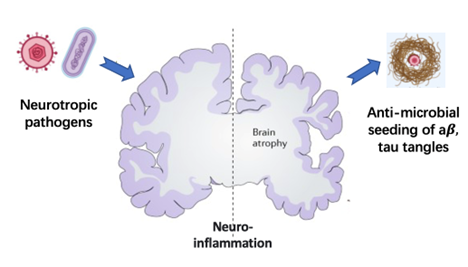Prof Shaojun Tang
PhD in Bioinformatics
Assistant Professor, Thrust of Bioscience and Biomedical Engineering, HKUST (GZ)
Affiliate Assistant Professor, Division of Life Science
Alzheimer’s Disease (AD) is the sixth leading cause of death. It is a major cause of disability and premature death among elderly people worldwide. AD represents a substantial medical, social, and financial burden to the society, however, the identification of significant risk factors for AD remains relatively sparse.
The association between inflammation and the characteristic features of AD has been widely acknowledged. Proposed mechanisms include the modulation of pathological protein misfolding and aggregation. These aggregates, in turn, may induce further neuroinflammation, and the infiltration of immune cells from the peripheral system into the central nervous system, thus perpetuating a cascade effect. Such a cascade could be triggered by various endogenous and exogenous factors, including microbial pathogens.
Emerging data suggests the neuroprotective and anti-neuroinflammatory effects of glucosamine. Animal study suggested that glucosamine may promote cognitive function by impacting energy metabolism and may prevent a wide range of diseases. Importantly, cross-sectional research recorded the association between glucosamine consumption and better cognitive function.
The question of whether a causal association exists between glucosamine use and dementia risk remains elusive, thus, a large-scale prospective study with adequate control for potential bias and reverse causation is warranted to assess the longitudinal association of glucosamine use with the incidence of dementia. Based on UK Biobank study of nearly 500,000 British people, we plan to investigate the relationship between regular use of glucosamine and the risk of all-cause dementia, AD and vascular dementia. To test the causal association between glucosamine use and dementia, we propose to conduct a 2-sample mendelian randomization study utilizing summary statistics from genome-wide association studies (GWAS). The GWAS data will be obtained from observational cohort participants of mostly European ancestry. In the GWAS study, we plan to explore potential modifying effects by several established risk factors (including APOE ε4 genotypes) for dementia.
